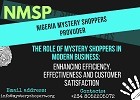

In the contemporary business environment, where customer experience often dictates success, the use of mystery shoppers has emerged as a critical strategy for organizations aiming to optimize their operations. This practice not only enhances customer satisfaction but also promotes efficiency and effectiveness in service delivery. By employing mystery shoppers, businesses can gather valuable insights into the appropriateness of services offered, ultimately leading to profit maximization.
UNDERSTANDING MYSTERY SHOPPING
Mystery shopping is a market research technique where individuals are hired to pose as customers to evaluate the quality of service, compliance with regulations, and overall customer experience. These evaluations provide businesses with objective data that can inform decision-making and strategic improvements.
EFFICIENCY AND EFFECTIVENESS IN SERVICE DELIVERY
One of the primary roles of mystery shoppers is to assess the efficiency of service delivery. By observing interactions between staff and customers, mystery shoppers can identify bottlenecks or inefficiencies in processes. For instance, they may note whether employees adhere to established protocols, how quickly they respond to customer inquiries, and whether they provide accurate information.
Additionally, mystery shoppers evaluate the effectiveness of service delivery, which encompasses both the quality of interaction and the ability to meet customer needs. By measuring these factors, businesses can pinpoint areas for improvement, ensuring that their service strategies align with customer expectations.
ENHANCING CUSTOMER SATISFACTION
Customer satisfaction is a pivotal metric for any business, influencing customer loyalty and brand reputation. Mystery shoppers play a crucial role in assessing various dimensions of customer satisfaction, such as service orderliness, staff professionalism, and the overall ambience of the business environment.
For example, a mystery shopper might evaluate whether a retail store is well-organized, making it easy for customers to navigate and find products. Similarly, they may assess how staff handle complaints or special requests, directly impacting the customer’s overall experience. Insights from these evaluations can lead to targeted training programs and operational adjustments, fostering a culture of service excellence.
APPROPRIATION OF SERVICES
The appropriateness of services is another critical area that mystery shoppers can illuminate. By analysing customer interactions, businesses can determine whether their offerings align with customer expectations and market trends. For instance, if mystery shoppers frequently report that staff are not knowledgeable about products or services, this may indicate a need for enhanced training or even a re-evaluation of the product line up.
This appropriation of services is vital for maintaining competitive advantage in a crowded marketplace. Businesses that fail to adapt to customer needs risk losing market share, while those that utilize mystery shopping insights can refine their offerings to better meet expectations.
PROFIT MAXIMIZATION
Ultimately, the insights garnered from mystery shopping contribute to profit maximization. By improving efficiency, effectiveness, and customer satisfaction, businesses can enhance their overall performance. Satisfied customers are more likely to return, recommend the business to others, and engage in repeat purchases, all of which positively impact the bottom line.
Moreover, by identifying areas where costs can be reduced—such as minimizing service delays or optimizing staff deployment—businesses can further drive profitability. The data collected through mystery shopping can lead to informed decisions that enhance operational performance and revenue generation.
SERVICE ORDERLINESS
Service orderliness is a fundamental aspect of the customer experience that mystery shoppers assess. A well-organized service environment not only facilitates smoother transactions but also creates a positive impression on customers. This includes everything from the layout of a retail space to the cleanliness and maintenance of facilities.
When mystery shoppers report on service orderliness, businesses gain insights into how physical and operational aspects of their environment influence customer perceptions. A focus on service orderliness can lead to improved customer flow and reduced frustration, ultimately enhancing satisfaction.
CONCLUSION
In conclusion, the role of mystery shoppers in modern business is multifaceted and invaluable. By focusing on efficiency, effectiveness, customer satisfaction, the appropriation of services, profit maximization, and service orderliness, organizations can leverage the insights gained from mystery shopping to refine their strategies and operations. As businesses continue to navigate an increasingly competitive landscape, the implementation of mystery shopping programs will remain a key driver of success, ensuring they meet and exceed customer expectations.